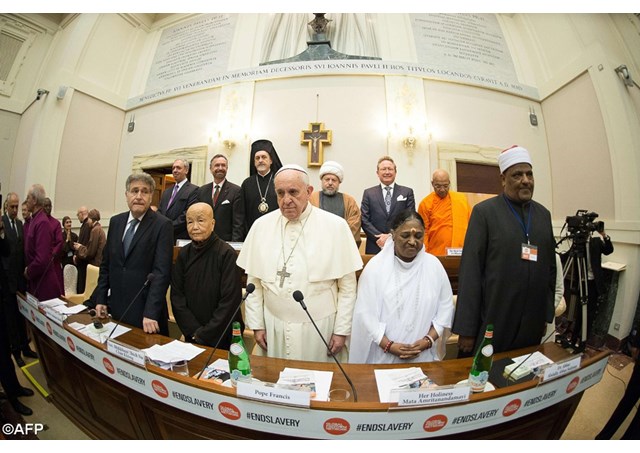
Forging closer partnerships between state and faith-based groups

(Vatican Radio) When Pope Francis and religious leaders from half a dozen other faiths signed a joint declaration on December 2nd pledging to end modern-day slavery, it was hailed as an unprecedented example of representatives from many different faiths coming together to tackle the scourge of slavery and human trafficking. Many governments too are seeking to increase their partnerships with faith-based organisations to help serve people in need and a number of them sent representatives to attend the signing ceremony. Among those representatives were two senior U.S. officials whose job is to help promote and nurture those partnerships between government and faith-based groups. They were Melissa Rogers, Special Assistant to President Obama and Director of the White House Office of Faith-Based and Neighborhood Partnerships and Mark Brinkmoeller, Director of the Center for Faith-based and Community Initiatives at the US Agency for International Development. Rogers and Brinkmoeller both sat down with Susy Hodges afterwards to speak about their work and began by giving their reaction to this global anti-slavery initiative, spearheaded by Pope Francis.
Listen to the round table interview with Melissa Rogers and Mark Brinkmoeller:
Both Rogers and Brinkmoeller praised the signing of the joint declaration against modern slavery and human trafficking. Rogers described it as “a great day for the anti-trafficking effort” and said the U.S. was “grateful to Pope Francis for his leadership” on this key issue whilst Brinkmoeller said the signing ceremony by religious leaders representing over 90 percent of the world’s population was “inspiring and motivating.”
Both of them explained how they are always trying to increase partnerships between state organisations and faith-based groups because they recognize the vital role played by the latter in helping the needy, especially, as Brinkoeller points out, in many of the world’s poorest countries.
“30 – 60% of the health care in sub-Saharan Africa is delivered by faith-based institutions in some countries.” He says these institutions are “trusted and respected” … “by the people on the ground they’re trying to serve” … “so they have that moral credibility.”
Rogers says the ongoing Ebola emergency in West Africa is another example of where these partnerships between government and faith-based groups prove of benefit to both sides and they hold regular meetings “to share information” on the latest developments and discuss what needs to be done. Brinkmoeller notes that faith-based organization are “our key implementers” and says one example is Catholic Relief Services who have “a number of grants (from USAID) to fight Ebola.”
| All the contents on this site are copyrighted ©. |


